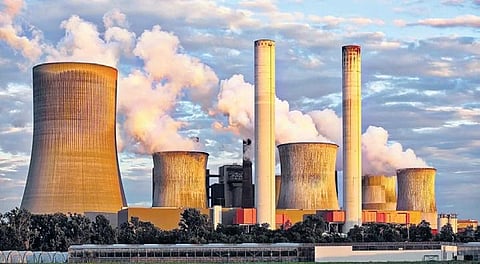

CHANDIGARH: In a move aimed at tackling air pollution caused by stubble burning, the Centre may soon make it mandatory for coal-based thermal power plants in Delhi National Capital Region and adjoining areas to use crop residue pellets in combination with the coal. The non-compliance of the same will attract an environmental penalty to the tune of 2 to 5 paisa per unit, which will likely push the cost of power up.
As per the draft rules titled ‘Agro residue utilisation by thermal power plants rules, 2023’ released by the Union Ministry of Environment, Forest and Climate Change, all coal-based thermal power plants run by power generation utilities shall on an annual basis mandatorily use minimum 5 per cent blend of pellets or briquettes made of crop residue along with coal, with non-compliant plants facing penalties in the future. These rules are likely to be finalised in two months after receiving inputs from stakeholders.
Under these rules, the non-compliant power plants will be subject to a graded environmental compliance penalty, which will be between 2 to 5 paisa per unit. “Environmental Compensation shall be levied by Commission for Air Quality Management (CAQM) in the National Capital Region and Adjoining Areas or any officer authorized by CAQM on annual basis at the rate specified,” said the draft rules.
The draft rules further direct state governments to provide land for the installation of pellet manufacturing units, as these new rules will be treated as a change in the law to determine tariffs by the Central Electricity Regulatory Commission or State Regulatory Commissions. Although the use of crop residue pellets may lead to an increase in the cost of power in Punjab, the move is expected to have significant benefits in terms of reduced air pollution and increased energy efficiency, which could have positive long-term effects on public health.
The move to use bio pellets has been a non-starter in Punjab due to the ‘non-availability’ of their adequate quantity for use in thermal power plants. In October last year, four out of five thermal plants in Punjab were included in the ‘Sustainable Agrarian Mission To Use Agri-Residue In Thermal Power Plants’ launched by the Union government.
These plants were required to blend at least 5 to 10 per cent biomass pellets in the total coal used to generate power. However, the limited number of pellet-making units produced only a few tonnes of pellets each day, which were hardly sufficient to meet the minimum daily requirement of thermal plants, which was more than 3000 tonnes a day, said sources.
Who will certify crop residue?
An efficient supply chain to ensure sufficient bio pellets is not yet in place, and the commercial implications arising out of the utilization of bio pellets have also not been taken into consideration. In addition, the authorities have mandated that these biomass pellets should have 50 per cent content of crop residue, however, it is not known which government agency will certify the crop residue. The thermal plants in the state are unable to get enough quantity of the same to meet the mission guidelines, which can create a power blackout in Punjab